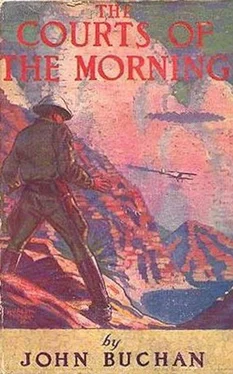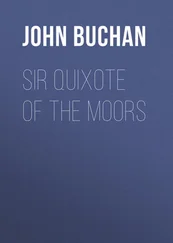John Buchan - The Courts of the Morning
Здесь есть возможность читать онлайн «John Buchan - The Courts of the Morning» — ознакомительный отрывок электронной книги совершенно бесплатно, а после прочтения отрывка купить полную версию. В некоторых случаях можно слушать аудио, скачать через торрент в формате fb2 и присутствует краткое содержание. Жанр: unrecognised, на английском языке. Описание произведения, (предисловие) а так же отзывы посетителей доступны на портале библиотеки ЛибКат.
- Название:The Courts of the Morning
- Автор:
- Жанр:
- Год:неизвестен
- ISBN:нет данных
- Рейтинг книги:3 / 5. Голосов: 1
-
Избранное:Добавить в избранное
- Отзывы:
-
Ваша оценка:
- 60
- 1
- 2
- 3
- 4
- 5
The Courts of the Morning: краткое содержание, описание и аннотация
Предлагаем к чтению аннотацию, описание, краткое содержание или предисловие (зависит от того, что написал сам автор книги «The Courts of the Morning»). Если вы не нашли необходимую информацию о книге — напишите в комментариях, мы постараемся отыскать её.
The Courts of the Morning — читать онлайн ознакомительный отрывок
Ниже представлен текст книги, разбитый по страницам. Система сохранения места последней прочитанной страницы, позволяет с удобством читать онлайн бесплатно книгу «The Courts of the Morning», без необходимости каждый раз заново искать на чём Вы остановились. Поставьте закладку, и сможете в любой момент перейти на страницу, на которой закончили чтение.
Интервал:
Закладка:
What with one thing and another we had rather a jolly evening. But next morning, when the Roylances had gone, I had the same impression of some subtle change. This new Sandy was not the one I had known. We went for a long tramp on the hills, with sandwiches in our pockets, for neither of us seemed inclined to shoulder a gun. It was a crisp morning with a slight frost, and before midday it had become one of those blazing August days when there is not a breath of wind and the heather smells as hot as tamarisks. We climbed the Lammer Law and did about twenty miles of a circuit along the hill-tops. It was excellent training for Machray, and I would have enjoyed myself had it not been for Sandy.
He talked a great deal and it was all in one strain, and--for a marvel--all about himself. The gist of it was that he was as one born out of due season, and mighty discontented with his lot.
"I can't grow old decently," he said. "Here am I--over forty--and I haven't matured one bit since I left Oxford. I don't want to do the things befitting my age and position. I suppose I ought to be ambitious--make speeches in the House of Lords--become an expert on some rotten subject--take the chair at public dinners--row my weight in the silly old boat--and end by governing some distant Dominion."
"Why not?" I asked.
"Because I don't want to. I'd rather eat cold mutton in a cabman's shelter, as Lamancha once observed about political banquets. Good Lord, Dick, I can't begin to tell you how I loathe the little squirrel's cage of the careerists. All that solemn twaddle about trifles! Oh, I daresay it's got to be done by somebody, but not by me. If I touched politics I'd join the Labour Party, not because I think them less futile than the others, but because as yet they haven't got such a larder of loaves and fishes."
"I want a job," he declared a little later. "I was meant by Providence to be in a service, and to do work under discipline--not for what it brought me, but because it had to be done. I'm a bad case of the inferiority complex. When I see one of my shepherds at work, or the hands coming out of a factory, I'm ashamed of myself. They all have their niche, and it is something that matters, whereas I am a cumberer of the ground. If I want to work I've got to make the job for myself, and the one motive is personal vanity. I tell you, I'm in very real danger of losing my self-respect."
It was no good arguing with Sandy in this mood, though there were a great many common-sense things I wanted to say. The danger with anyone so high-strung and imaginative as he is that every now and then come periods of self-disgust and despondency.
"You're like Ulysses," I told him. "The fellow in Tennyson's poem, you know. Well, there's a widish world before you, and a pretty unsettled one. Ships sail every day to some part of it."
He shook his head.
"That's the rub. As I've told you, I can't grow up. There's a couple of lines by some poet that describes me accurately: 'He is crazed by the spell of far Arabia, It has stolen his mind away.' Far Arabia--that's my trouble. But the Ulysses business won't do for an ageing child of forty. Besides, what about the mariners? Where are the 'free hearts, free foreheads?' We used to have a rather nice little Round Table, Dick, but it is all broken up now and the wood turned into cigar-boxes for wedding presents. Peter is dead, and you and Archie are married, and Leithen and Lamancha are happy parts of the machine."
"There's still Blenkiron."
"He doesn't count. He was a wandering star, that joined us and revolved cheerfully with us for a little, and then shot back to where it belonged.... You can't alter it by talking, my dear chap. I'm the old buccaneer marooned on a rock, watching his ancient companions passing in ocean liners."
We had reached the top of the hill above Laverlaw and were looking down into the green cup filled with the afternoon sunlight, in which the house seemed as natural a thing as a stone from the hillside. I observed that it was a very pleasant rock to be marooned on. Sandy stared at the scene, and for a moment did not reply.
"I wish I had been born an Englishman," he said at last. "Then I could have lived for that place, and been quite content to grow old in it. But that has never been our way. Our homes were only a jumping-off ground. We loved them painfully and were always home-sick for them, but we were very little in them. That is the blight on us--we never had any sense of a continuing city, and our families survived only by accident. It's a miracle that I'm the sixteenth Clanroyden.... It's not likely that there will be a seventeenth."
Chapter III
I left Laverlaw rather anxious about Sandy, and during our time at Machray I thought a good deal about my friend. He was in an odd, jumpy, unpredictable state of mind, and I didn't see what was to be the outcome of it. At Machray I had a piece of news which showed his restlessness. Martendale, the newspaper man, came to stay, and was talking about boats, for his chief hobby is yacht-racing.
"What's Arbuthnot up to now?" he asked. "I saw him at Cowes--at least I'm pretty sure it was he. In an odd get-up, even for him."
I said that I had been staying with Sandy in August and that he had never mentioned Cowes, so I thought he must be mistaken. But Martendale was positive. He had been on the Squadron lawn, looking down on the crowd passing below, and he had seen Sandy, and caught his eye. He knew him slightly, but apparently Sandy had not wanted to be recognised and had simply stared at him. Martendale noticed him later, lunching out of a paper bag with the other trippers on the front. He was dressed like a yacht's hand, rather a shabby yacht's hand, and Martendale said that he thought he had a glimpse of him later with some of the crew of the big Argentine steam yacht, the Santa Barbara, which had been at Cowes that year. "The dago does not make an ornamental sailor," said Martendale, "and if it was Arbuthnot, and I am pretty certain it was, he managed to assimilate himself very well to his background. I only picked him out of the bunch by his clean-cut face. Do you happen to know if he speaks Spanish? They were all jabbering that lingo."
"Probably," I said. "He's one of the best linguists alive. But, all the same, I think you were mistaken. I saw him a fortnight later, and, I can tell you, he isn't in the humour for escapades."
In November, when I ran up to London from Fosse for a few days, I got further news of Sandy which really disquieted me. It appeared that he had gone down to the grass countries to hunt--a fact which in itself surprised me, for, though a fine horseman, he had always professed to hate hunting society. But for some reason or other he kept a couple of horses at Birkham and spent a lot of time there. And he seemed to have got mixed up with a rather raffish lot, for since the War the company in the Shires has not been what you might call select. The story told to me was that at a dinner where much champagne was swallowed Sandy had had a drunken row with a young profiteering lout, which had just about come to blows. He seemed to have behaved rather badly at dinner and worse later, for after having made a scene he had bolted, shown the white feather, and refused to take responsibility for what he had done.
Of course I didn't believe a word of it. In the first place, Sandy was as abstemious as a Moslem; in the second place, he had the temper of a seraph and never quarrelled; and, in the third place, he didn't keep any white feathers in his collection. But the story was repeated everywhere and, I am sorry to say, was believed. You see, Sandy had a great reputation in a vague way, but he hadn't the kind of large devoted acquaintance which could be always trusted to give the lie to a slander. And I am bound to say that this story was abominably circumstantial. I had it from an eye-witness, quite a decent fellow whose word it was hard to disbelieve. He described a horrid scene--Sandy, rather drunk and deliberately insulting an ill-tempered oaf in the same condition, and then, when it almost came to fisticuffs, funking the consequences, and slipping off early next morning without a word of explanation.
Читать дальшеИнтервал:
Закладка:
Похожие книги на «The Courts of the Morning»
Представляем Вашему вниманию похожие книги на «The Courts of the Morning» списком для выбора. Мы отобрали схожую по названию и смыслу литературу в надежде предоставить читателям больше вариантов отыскать новые, интересные, ещё непрочитанные произведения.
Обсуждение, отзывы о книге «The Courts of the Morning» и просто собственные мнения читателей. Оставьте ваши комментарии, напишите, что Вы думаете о произведении, его смысле или главных героях. Укажите что конкретно понравилось, а что нет, и почему Вы так считаете.












